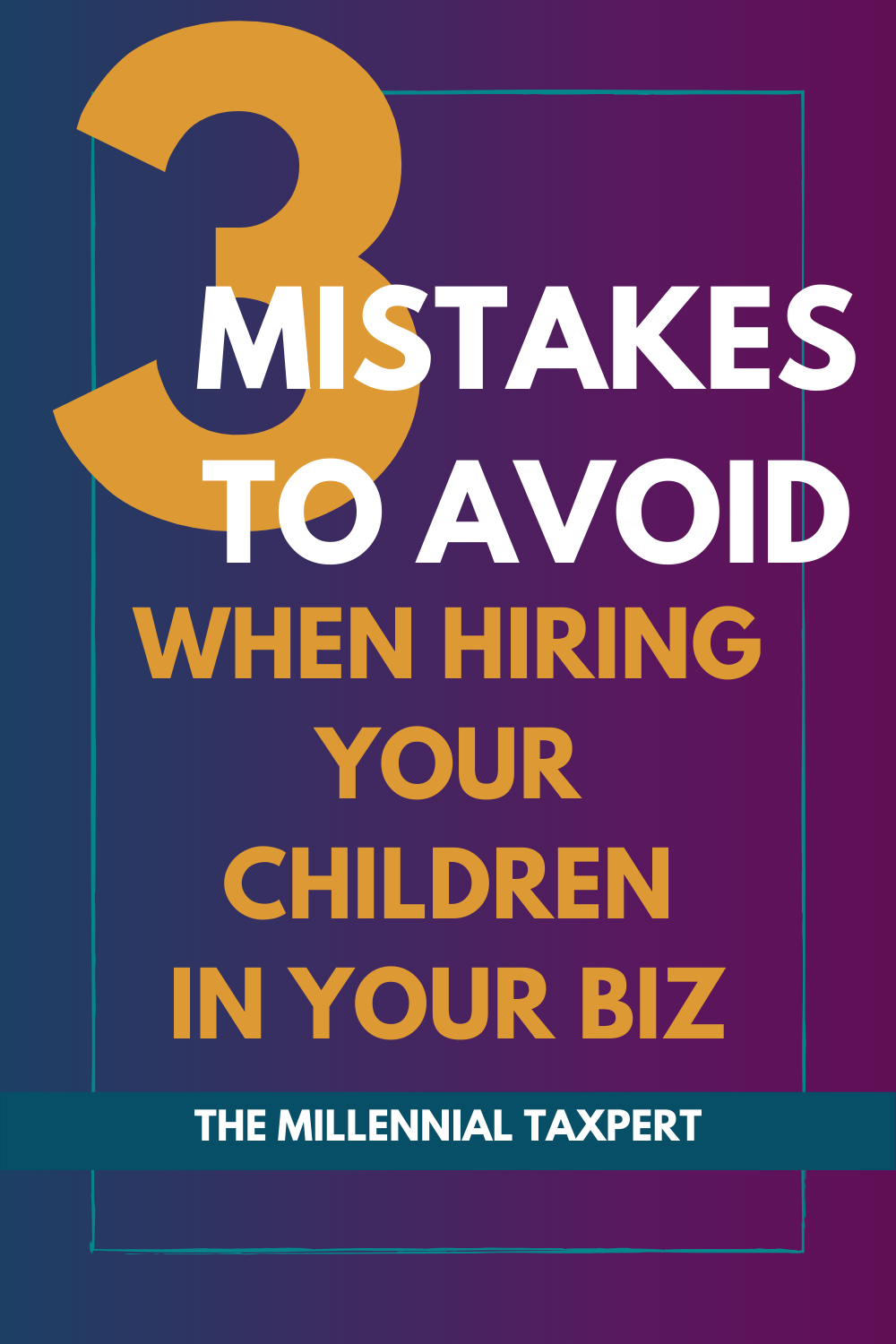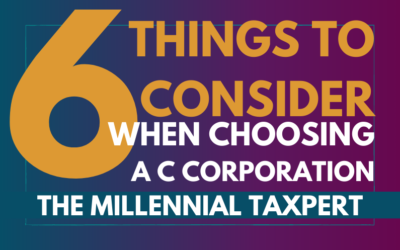Episode 26 | 9 Mins
3 Mistakes to Avoid When Hiring Your Children
Hiring your children can definitely save you money but you want to make sure you do it correctly. In this episode, I discuss three mistakes that you should avoid when hiring your children.
Listen
Watch
Read
(this transcript has been edited to improve readability)
So let’s go ahead and get right into it.
The first mistake that you want to avoid when hiring your children is not keeping good records. So when I was researching Tax Court cases about this very strategy, one common theme that I noticed for people that lose most, if not all, of their deduction is that they didn’t keep proper records. In many cases, they didn’t have records showing that the children actually worked for the business in the first place, let alone how much they actually got paid. So in your business, you should have records that detail your child’s job description, and their responsibilities. You should have records that indicate when your child works such as timecards, and what they did, and records that indicate when, how, and how much your child was paid. You should have regular pay periods, and your records should show that your children were paid in accordance with the hours that they worked during those pay periods. And of course, you’ll want to make sure that you’re following any required payroll paperwork with the various government agencies and keeping those records.
The second mistake that you want to avoid is paying your children too much money. Look, I know that the goal is to reduce your tax burden by as much as possible. So sometimes you’ll be tempted to just deduct all of the money, right? You’ll be tempted to indicate that you pay your child “the max”, so that you can deduct “the max”… and you know what I’m talking about when I say the max, right? The folks on the internet say that you can pay your child $12,000, so you want to deduct $12,000. But the thing is, the wages that you pay to your children have to be reasonable. This means that they have to be in line with the work that they’re doing, their skill level, and their age, among other things. So you’ll want to determine what you’d reasonably pay an outsider with the same skill set to do the same level of work that your child is going to do, and price accordingly. Sometimes that means that you aren’t going to be able to, quote unquote “max out their pay”. But if you’d pay somebody else with the same qualifications, and the same skill set, minimum wage to do the same job that you’re hiring your child to do, then your child’s wages should probably be pretty close to minimum wage. Right? So you wouldn’t pay your child with barely any camera skills, the same rate that you would pay a professional photographer with a million years of experience. That’s probably not going to pass the smell test. Remember your children that you’re hiring are actual employees and you have to treat them as such, and the IRS in the court again scrutinize these transactions. So you don’t want to give them any ammo that will cause them to disallow your deduction completely.
And the third mistake that we’re going to talk about today is counting chores or housework as work performed in the business. In the 2006 US Tax Court case, Alexander v Commissioner, the Alexander’s had their children cleaning, vacuuming, taking out the trash, mowing the lawn, and helping their parents run errands such as grocery shopping. And the court noted that these chores were “part of parental training and discipline rather than services rendered by an employee for an employer”, and they denied the deduction. Now the thing is that no two businesses are the same right. So your particular situation may call for additional cleaning, additional trash being taken out, additional trips to the grocery store because of your business. And you could probably justify paying your children to do the work above and beyond what they would normally do. Examples would be like if you had an in home daycare or in home salon, or you hosted events, meetings or parties at your house. But this all goes back to keeping good records, right? Because if you can show that the activities that your child does are actually increased because of the business and therefore are actually business related and not just chores, you probably have a chance of sustaining that deduction. But if you can’t show that there was an increase in the need for your child to perform these activities above and beyond regular maintenance of the home, just don’t even do it. It’s going to be considered regular housework or chores and therefore not deductible and if you try to take it to court, they may laugh you out of the courtroom, right.
So again, the three mistakes that you want to avoid:
1) not keeping proper paperwork
2) paying your child too much
3) and paying them for chores (you can pay them for chores, but you can’t deduct it as a business expense)
So that’s all that I have for you this week. This was a shorter episode. If you want more information about hiring your kids, check out my ebook, how to hire your kids at www.millennialtaxpert.com/hireyourkids. And with the ebook, you actually have the option to add on a webinar that I did. That goes over several Tax Court cases where wages paid to the taxpayers children was one of the issues and in that webinar, I break down the cases and go over the lessons learned from each one. So it’s a pretty good thing for you to look at. I’m a nerd Of course so I loved going up and doing those research on those cases. So hopefully if you just choose to purchase it and add it on you actually learn something. So make sure you come hang out with me next week on your favorite podcast platform, when I’m going to discuss the four side effects of hiring your children in your business, other than the tax benefits.
Talk to you then.
Click here to join me on Instagram, and don’t forget to share this article with friends!


Kesha JonTae'
Host
Follow Me
Pin This Episode

Related Episodes
Choosing a C Corporation | 6 Things to Consider
Episode 36 | 24 Mins Choosing a C Corporation | 6 Things to Consider How do you know if a C corporation is right for your business? A C Corporation is the default corporation type. Many people consider C Corporations to be for big companies, but they can be...
Choosing an S Corporation | 6 Things to Consider
Episode 35 | 17 Mins Choosing an S Corporation | 6 Things to Consider How do you know if an S corporation is right for your business? ListenWatchRead (this transcript has been edited to improve readability)As tax professionals, we get the question all the time, "what...


